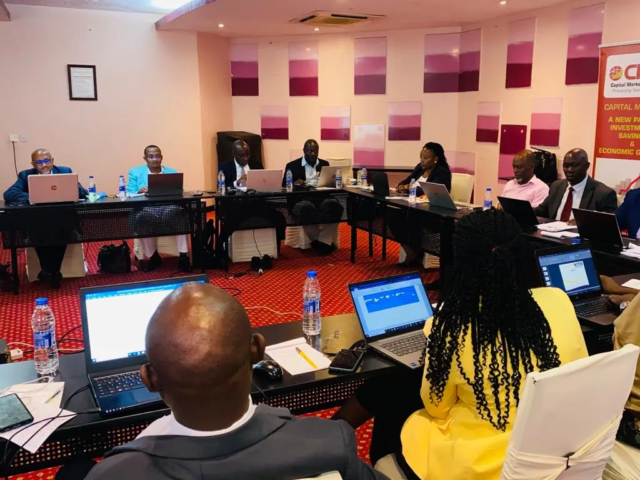
Regional capital markets regulators under their umbrella body, the East African Securities Regulatory Authorities (EASRA) have recommended the inclusion of more East African member states into the organization, with particular reference to the latest entrants Democratic Republic of Congo (DRC) and the Republic of South Sudan.
During their 52nd consultative regional meeting hosted at Kampala’s Royal Suites Bugolobi from 11th to 13th of October 2023, Keith Kalyegira, the CEO of Capital Markets Authority (CMA) Uganda and the current Chairman of EASRA, reinforced the collective ambition of the association.
“We will extend a formal invitation to DRC and South Sudan to join EASRA, solidifying regional and country roadmaps to further bolster East Africa’s capital markets industry,” Mr. Kalyegira said emphasizing the importance of cross-border information sharing.
“It was agreed that another EASRA Strategic Plan with a vision: to foster the development of an integrated East African capital market be developed. This is to be achieved through advocacy, innovation, capacity building, harmonisation of regulations and laws, and knowledge sharing, ultimately positioning the EAC capital market as a respected platform for mobilizing long-term capital for economic development. The Strategic Plan will also serve as a roadmap for EASRA members in the region,’ he added.
EASRA members noted the progress Burundi has made in the establishment of their capital markets.
Recognizing the significance of green finance, EASRA reaffirmed their commitment to adopting the ISSB (International Sustainability Standards Board) standards, S1 and S2. Wycliffe Shamiah, the CEO of CMA Kenya called upon EASRA members to collaborate with accounting professionals and standard-setting bodies in the members’ respective countries to harmonize and promote these standards, concurrently embarking on conducting awareness and sensitization campaigns.
Emphasizing the critical role of SME financing in fostering market growth, EASRA members committed to the continual development and harmonization of the regulatory framework, thereby facilitating the expansion of capital markets across the East African Community (EAC), with particular emphasis on crowdfunding regulations.
The CEO of CMSA Tanzania highlighted the role of robust legal frameworks in supporting SMEs and the evident improvements in this sector. He also expressed the need for harmonized regulations in Islamic financing and crowdfunding, emphasizing the utilization of country-specific legal frameworks to address challenges conclusively.
CMA Rwanda highlighted the Collective Investment Schemes (CIS) legal framework which caters for CIS formations under different types such as; Partnerships, Companies, Trusts and contractual schemes provisions hence strengthening the available pool of savings for deploying into the economy.
The gathering underlined the necessity of cross-border information sharing to facilitate enforcement actions in line with the information sharing emphasized for members of the International Organization of Securities Commissions (IOSCO) multilateral memorandum of understanding (MMOU).
In closing, the Consultative Committee underscored the collective responsibility of EASRA members in the development of EAC Capital Markets, with a firm commitment to harmonize legal and regulatory frameworks in order to ease capital raising and investing across the region.
Uganda, Kenya, Rwanda, and Tanzania all attended the region. Notable attendees included Keith Kalyegira, CEO of Capital Markets Authority (CMA) Uganda; Wycliffe Shamiah, the CEO of CMA Kenya; CPA Nicodemus D. Mkama, CEO of Capital Markets and Securities Association (CMSA) Tanzania; and CMA Rwanda, represented by Carine Twiringiyimana, a Financial Analyst at CMA Rwanda.
Subcommittees from various East African countries, comprising Market Development, Market Supervision, and Legal Affairs, engaged in extensive discussions on various pivotal subjects. These included regulatory sandboxes, ESG (Environmental, Social, and Governance), Private Equity & Venture Capital regulations, Crowdfunding, and Islamic financing, with a special emphasis on Small and Medium-sized Enterprise (SME) financing.






